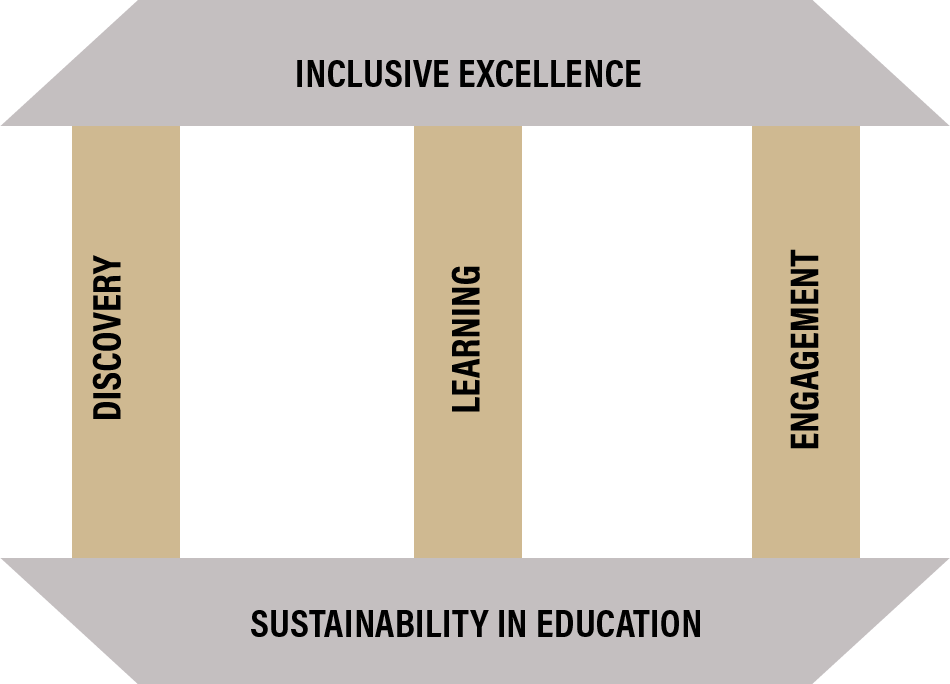Strategic Themes and Goals
2021-2026 Strategic Plan
Strategic Themes
The strategic plan is not intended to be all-encompassing. It is designed to provide focus on key initiatives we commit to act on to move toward our vision. We believe the goals, action steps, and metrics of success are within the COE’s influence to change, address, and/or improve upon.
The strategic plan goals are focused on Inclusive Excellence and Sustainability in Education that are supported by Discovery, Learning, and Engagement.

Our goals are aligned with our values, vision, and mission to take decisive steps through a five-year strategic plan period ending in 2026 focused on inclusive excellence and sustainability in education. Strategic plans work when there is a clearly established execution plan that includes focused goals, action steps, and metrics of success.
Strategic Plan Overview
Goal 1: Implement teacher education innovation as a means of improving sustainable practices in education that impact the world around us.
Goal 2: Increase student enrollment and retention with recruiting emphasis on historically underrepresented groups.
Goal 3: Promote positive climate practices that value and showcase work in support of inclusive excellence.
ALL GOALS INCLUDE AND DEPEND ON THE DEVELOPMENT OF A COMPREHENSIVE DATA DASHBOARD
This strategic plan is predicated on careful measurement, data collection, and publishing of results. It is critical for the COE to commit to the development of an execution plan process including the development of data dashboards to monitor progress and results.
Inclusive Excellence
Equity mindset. Equal Choices. Equitable opportunities. Innovate. Together
We recognize inclusive excellence as integral to our vision, mission, and a just world. We believe inclusion is fundamental to excellence and thus integral to rigorous scholarly pursuits, and academic success. We believe in the intentional incorporation of cultures, worldviews, histories, traditions, talents, and perspectives of all people across all places. Inclusive excellence defines diversity broadly and includes race, nationality, ethnicity, language, religion, social class, age, (dis)ability, sexual orientation, and gender identity and gender expression, as well as diversity of thought. Inclusive excellence situates that diversity is a powerful, sustaining community strength that must be consistently and actively practiced to achieve outstanding discovery, learning, and engagement outcomes.
Sustainability in Education
Foundation in Transformation. Together.
The College of Education’s foundation for transformation is based in sustainability in education. Sustainability in education aims to develop knowledge, skills, and the motivation to act in ways that contribute to improving the interdependent connections of environmental, social, cultural, and economic systems to support enduring effectiveness. Communities are sustained when we invest in diversity, equity, and inclusive practices that allow ALL members of a community to engage, sustain, and improve their communities. Sustainability is at the root of educational endeavors in the College of Education, branching through all areas of activity and scholarship, including discovery, learning, and engagement.
Our Priorities and Goals:
Visionary. Innovative. Foundation in Transformation. Together.
The strategic plan goals are focused on Inclusive Excellence and Sustainability in Education built on our columns of Discovery, Learning, and Engagement. Our goals and strategic priorities are aligned with our values, vision, and mission to take decisive steps through this five-year strategic plan, laying a new foundation of inclusive excellence and sustainability in education. We accept the challenge that Purdue’s College of Education can be an incubator of innovation, laying the foundation for a better educational system for all. As such, our priorities ensure we will:
- Nurture a framework concerned with the present and future that has social justice at its core and focuses on the interdependence of communities, both locally and globally, in the context of an uncertain 21st century.
- Revitalize and sustain equitable communities through pedagogies of care enacted through culturally relevant, responsive, and sustaining pedagogies.
- Promote civic engagement and advocacy by nurturing discovery, engagement, and learning activities that work toward the well-being and development of all communities; support students, faculty, and staff in civic engagement and advocacy activities that build relationships with local, national, and global communities.
- Ground College of Education programs in a global perspective that is future-oriented and positions educators as change makers in a broad and powerful sense.
- Support classrooms as ecosystems where rich relationships honor interdependence and reciprocity and that emphasize empathy and social imagination.
- Facilitate the development of a knowledge base in the sciences and humanities and their relationship with the environment and societal well-being.
Strategic Plan Overview
Goal 1: Implement teacher education innovation as a means of improving sustainable practices in education that impact the world around us.
Goal 2: Increase student enrollment and retention with recruiting emphasis on historically underrepresented groups.
Goal 3: Promote positive climate practices that value and showcase work in support of inclusive excellence.
ALL GOALS INCLUDE AND DEPEND ON THE DEVELOPMENT OF A COMPREHENSIVE DATA DASHBOARD